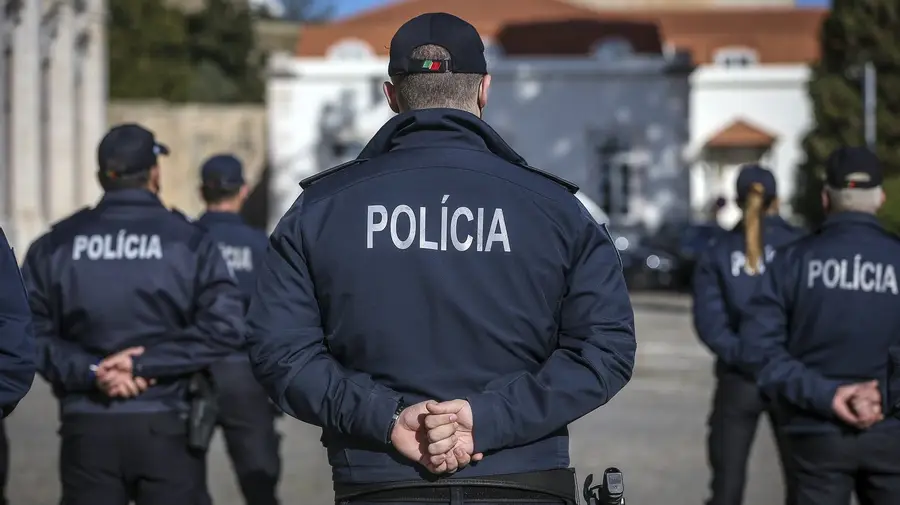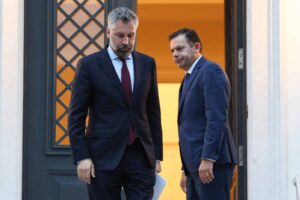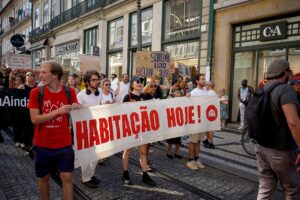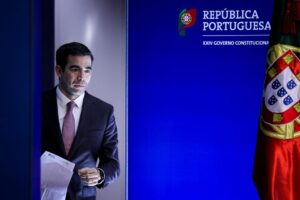… if one doesn’t dwell too much on juvenile delinquency, group crime and international drug trafficking
In another of his slightly ‘off-centre’ remarks in the last 24-hours, Portugal’s prime minister Luís Montenegro has said today that Portugal has “reason to say loud and clear that it is one of the safest countries in the world”, in spite of the increase in “certain types of crime (…) very much on display in Lisbon and Porto, scaring people as well”.
It wasn’t quite the same as saying the increase in numbers on domestic violence ‘wasn’t really an increase at all’, but it was pretty much along the same lines.
The PM was speaking during the swearing-in of the director-general of Reinsertion and Prison Services, Orlando Carvalho, and the national director of the Judicial Police, Luís Neves, (who is serving a third mandate at his post), which took place at the Ministry of Justice in Lisbon.
“We need to tell the Portuguese that we have reason to trust our police, we have reason to trust our public services and we have reason to say loud and clear that we are a safe country, one of the safest in the world,” said the prime minister.
The head of government admitted concern about the increase in some criminal phenomena, such as juvenile delinquency and group crime, the fight against corruption and international and even national drug trafficking, “very much on display, especially in Lisbon and Porto, scaring people as well (…) but let’s also not forget to say that one of the country’s greatest factors for competitiveness is being safe, and it is safe because we have people and institutions that are qualified to guarantee that safety,” he went on.
Considering the speech came days after the family of a man shot dead by police (in circumstances that are far from clear) announced that they are moving forwards with an official complaint for abuse of power, it showed a little how Portugal moves on different levels; in almost parallel universes.
The prime minister pointed to security as one of the factors of internal competitiveness, along with the country’s good geopolitical and geostrategic location, “a good qualification of its human resources, a good academy, good researchers, good science, good business projects, quality of life, a very rich natural heritage (…) It is up to all of us, with the instruments we have, to ensure that we continue to be a safe country and a country whose values include safeguarding the dignity of the individual, safeguarding the rights of women and men who live, work or pass through here,” he added.
The PM also praised the newly appointed Orlando Carvalho and Luís Neves, “both proven personalities with the ambition to do even more and better in the future”.
To Orlando Carvalho, Mr Montenegro gave assurances that the government intends to “continue to take measures so that the prison services give society an image of safeguarding the rights of prisoners, but also of security in the face of what have been episodes that lead in the opposite direction”.
This was an elegant way of saying the government hopes not to see any more daylight mass escapes by prisoners from high security jails.
It was the recent escape of five inmates, considered highly dangerous (two have been recaptured) that led to the resignation of the former director-general of Reinsertion and Prison Services, and the need to appoint a new one.
“It is our intention to continue investing in physical spaces and to continue investing in human resources,” Mr Montenegro concluded.
To Luís Neves, the PM said: “We have to be aware that it is often due to the work of the police, criminal policy bodies and the judiciary (…) that, in some cases, we reach the end of the year and see an increase in reported crime. And that doesn’t always mean that the number of crimes has increased,” (no, it could be like with domestic violence – “an increase in knowledge” of crimes being committed. A sign of the excellence of this country’s police forces). ND
Source material: LUSA




















